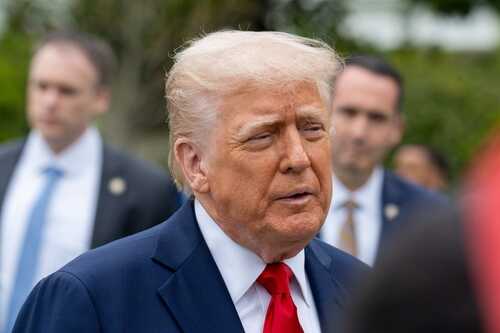(LibertySociety.com) – Speaker Mike Johnson says the House has a “big appetite” for hammering Russia with new sanctions, but the real battle may be over who gets the final say, Congress or President Trump, on how much pain we actually inflict on Putin’s regime.
At a Glance
- House and Senate leaders unite behind sweeping new sanctions targeting Russia’s energy sector and top officials.
- President Trump supports sanctions but insists on the power to waive or modify them, sparking congressional pushback.
- Bipartisan “Sanctioning Russia Act of 2025” moves rapidly toward a Senate vote as Ukraine war grinds on.
- Negotiations over who controls U.S. foreign policy, Congress or the White House, could shape the bill’s final form.
Congress Eyes Russia’s Energy Lifeline, and Its Own Power
Speaker Mike Johnson is fed up and says it plainly: the House is ready to “talk tough and act tough” by slapping Russia with a punishing new round of sanctions. Johnson frames Vladimir Putin as a “bully” who has only doubled down on bloody attacks against Ukraine, dismissing every diplomatic overture with the arrogance of a dictator who believes he’ll never face real consequences. The bipartisan Sanctioning Russia Act of 2025, led by Republican Russia hawk Lindsey Graham and Democratic Senator Richard Blumenthal, is barreling through Congress with an astonishing 82 cosponsors, an almost unheard-of show of unity in today’s politics. The bill’s centerpiece is a direct assault on Russia’s energy exports, the cash cow that bankrolls Putin’s war machine. If it passes, Russian banks, oligarchs, and sectors like oil and gas will find the U.S. door slammed shut, with the threat of secondary sanctions for any foreign companies daring to do business with them.
But here’s where the plot thickens: President Trump, back in the Oval Office, isn’t exactly a fan of letting Congress tie his hands. He’s made it clear he wants the power to waive or tweak the sanctions when “necessary”, a very different approach from the last time Congress tried to micromanage Russia policy. Trump’s team is currently negotiating with Senate Majority Leader John Thune over just how much executive flexibility he’ll be granted. If Trump doesn’t get what he wants, he could veto the whole package, leaving Congress scrambling for a two-thirds override. The House may have an appetite for sanctions, but it’s also hungry for a fight over presidential power.
Putin, Ukraine, and the High Stakes of American Resolve
Putin isn’t losing sleep, yet. Every round of U.S. sanctions since the 2014 Crimea annexation has hurt, but Russia’s energy sector keeps the Kremlin coffers full. The new bill aims to finally close that loophole, targeting the oil, gas, and banking giants funding Russia’s war in Ukraine. Ukrainian leaders are cheering from the sidelines, desperate for anything that can tip the balance and force Moscow to the bargaining table. But the sanctions also come with a warning label: Squeeze Russia’s energy exports too hard, and global oil prices could spike, hitting American and European consumers right in the wallet. The White House and Congress are both acutely aware that this isn’t just about punishing Putin; it’s about not punishing ourselves in the process.
For U.S. businesses, especially those with international exposure, the new sanctions could mean new compliance headaches and the risk of retaliation. For Russian civilians, the economic noose will only tighten. And for the world? Get ready for another round of market volatility and saber-rattling, as Russia threatens to redirect trade to China and India, undermining U.S. leverage over time. Policy wonks on both sides warn that sanctions are a blunt instrument, effective only if the world moves together and enforces them ruthlessly.
Who Really Runs U.S. Foreign Policy?
The real drama isn’t just about Russia or Ukraine, it’s about whether Congress or the president gets to call the shots when America throws its weight around abroad. In the past, Congress tried to keep a tight leash on sanctions, forcing the president to seek permission to ease them. Trump, ever the executive, wants none of that. He argues that the president needs “maximum flexibility” to negotiate, threaten, or reward as needed. Congressional leaders, still smarting from years of executive overreach, aren’t eager to hand over the keys. The outcome of this power struggle could set a precedent for every future conflict, every rogue regime, and every time America decides to “act tough.”
As the Sanctioning Russia Act of 2025 heads for a Senate vote, every American who cares about real strength, and real accountability, should ask: Is it enough to finally stop Putin’s aggression? Or will it just be another round in the endless tug-of-war between Congress and the White House, while our enemies watch and laugh at the circus in Washington?
Copyright 2025, LibertySociety.com
Click this link for the original source of this article.
Author: Editor
This content is courtesy of, and owned and copyrighted by, https://libertysociety.com and its author. This content is made available by use of the public RSS feed offered by the host site and is used for educational purposes only. If you are the author or represent the host site and would like this content removed now and in the future, please contact USSANews.com using the email address in the Contact page found in the website menu.








